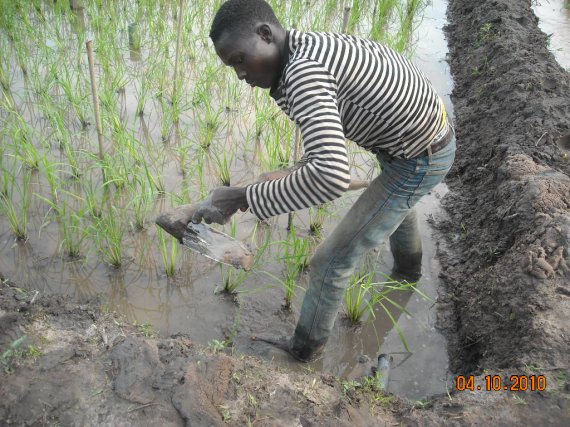The Beninese population is consuming more rice than the country’s farmers are producing. But during the first food crisis in 2007 the country faced great difficulty in importing rice at reasonable prices. In response, the government of Benin decided to invest in food security and rice intensification. Domestic rice production rose from 49,000 tons in 2006 to 96,000 tons in 2012. As a result, Benin is now nearly self-sufficient in rice, says Totin. How did that happen so quickly? Not by introducing new technologies. ‘Since 1972 governments have started many programmes aiming to increase rice production, but these programmes focussed on better technologies like the construction of large irrigation schemes and the farmers didn’t use these infrastructures.’ Since 2007 the policy emphasis has lain on providing institutional conditions for the farmers, such as market development, credit facilities for the farmers and subsidies on seeds and fertilizer. And these measures do increase rice production and improve income of the farmers. For his PhD study, Totin examined the incomes of rice growers in three regions in Benin and found out that their earnings have tripled in the past years. Many farmers used to sell their rice to local traders, says Totin. These traders gave for instance 10 dollars to the rice growers for investments and received a large bag of rice, worth 30 dollars, after harvest. In effect, the added value went to the local traders. Since 2007 the government has created milling facilities in the rice producing regions. These processing companies (or cooperatives) buy the rice directly from the farmers. Moreover, the government provides the farmers with quality seeds from agricultural research stations and the rice growers can receive a loan of 245 euros per hectare each year, which they pay back after harvest. These new conditions stimulated the farmers to change from vegetables to rice growing, expand the land for rice production, grow in more cycles per year, or develop more effective rules for sharing water. Although the new policy of the Benin government is successful, Totin doesn’t think it is a sustainable way to improve food security. ‘This government spends a lot of money on this issue, the next one may cut spending again. A business-led public-private partnership may be more reliable. I propose that the rice growers make contracts with the mills, in which they agree how much rice the growers will deliver at a guaranteed price. With this contract the growers can get a loan from the local banks. Because the mills are often cooperatives, in which the growers have part of the shares, they can also decide to invest in the processing facilities. But this institutional framework hasn’t developed yet.’ The research is financed by Wageningen UR’s Convergence of Sciences programme. Totin will defend his thesis at the end of this year.
Rice production doubles with proper food policy
Rice growers in Benin have doubled their production in the past five years. Improved market access and credit facilities were key reasons for this result, says researcher Edmond Totin.

